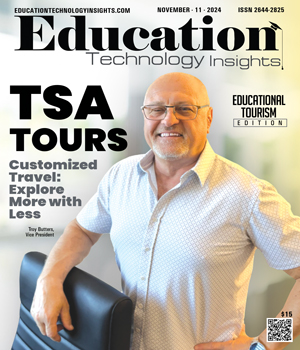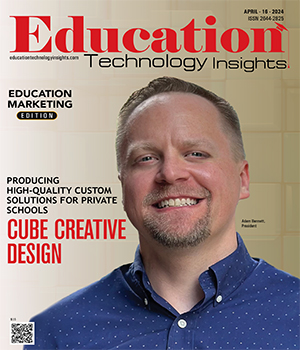THANK YOU FOR SUBSCRIBING
Be first to read the latest tech news, Industry Leader's Insights, and CIO interviews of medium and large enterprises exclusively from Education Technology Insights
Unlocking the Charm of Rural Mediterranean Education Tourism: The Role of Guest Houses
Laurent Yacoub, Head of the International Hotel & Tourism Department at Holy Spirit University of Kaslik
 Laurent Yacoub, Head of the International Hotel & Tourism Department at Holy Spirit University of Kaslik
Laurent Yacoub, Head of the International Hotel & Tourism Department at Holy Spirit University of KaslikTraveling in the center of the Mediterranean exposes a rich tapestry of customs, history, and culture. In this gorgeous setting, an original idea dawns— guest houses that provide more to visitors than merely lodging can also act as centers of education. This intriguing idea is the focus of my current research, which examines the role of guest homes in rural Mediterranean areas in combining sustainable tourism, education, and cultural immersion.
Educational Offering Beyond Lodging
These projects provide a variety of educational possibilities that redefine the traditional tourist experience. The focal point is workshops, which offer practical instruction in age-old skills, including weaving, soap-making, pottery, olive oil extraction, and the history of the region. Through these workshops, visitors not only learn new skills but also get a deep appreciation for the craftsmanship ingrained in the area's history.
The culinary journey is another delight. Locals-led cooking classes highlight the value of using fresh, locally sourced products while unlocking the mysteries of genuine Mediterranean cuisine. Cultural exchange initiatives and language classes broaden the educational spectrum by promoting linguistic appreciation and intercultural understanding.
Community Engagement: Empowerment and Upliftment
Central to these educational endeavors is community involvement. Local artisans and experts take the lead, becoming guardians of their heritage. This engagement empowers them economically and preserves traditional knowledge, ensuring its continuity for generations to come. These projects serve as rural communities' financial lifelines. The money made supports local companies and goes towards building infrastructure, promoting sustainable ecosystem growth.
Sustainability, Culture, and Education: A Harmonious Trio
Sustainability and cultural preservation go hand in hand in these educational models. Workshops on organic farming and eco-friendly techniques help visitors develop an awareness of environmental issues. Participating in events rooted in Mediterranean customs helps preserve the region's rich cultural heritage while educating future generations.
The focal point is workshops, which offer practical instruction in age-old skills, including weaving, soap-making, pottery, olive oil extraction, and the history of the region.
Impact and Future Prospects: Extending Beyond Borders
These educational guest houses have an impact beyond the short-term confines of a visitor's visit. When returning home, these encounters help visitors form enduring ties with Mediterranean culture. This creates a chain reaction that inspires a passion for cultural preservation and sustainability within their communities.
Prospects appear bright as more significant interactions become the preferred mode of travel. It heralds the era of responsible tourism, in which tourists look for deep educational opportunities and support projects that uplift local populations and conserve cultural assets.
Challenges and the Road Ahead
There are still difficulties despite the potential and promise. Major obstacles still include funding, accessibility, and preserving authenticity in the face of commercialization. These guest houses need community support, long-term collaborations, and ongoing innovation to evolve.
Conclusion: An Ongoing Journey of Discovery
In conclusion, my current research indicates that guest houses significantly influence the Mediterranean region as centers of education. They act as stimulants for deeply significant travel encounters that promote environmental stewardship, economic empowerment, and cross-cultural understanding. As these initiatives evolve, they serve as a living example of the transformational potential of education combined with environmentally conscious travel.
This article draws from my ongoing Research Paper on this topic, encapsulating the essence of my exploration into educational tourism in the rural Mediterranean.
Weekly Brief
Read Also
Goldilocks Regulation
Beyond the Quiz: Redefining Competence in eLearning
Beyond Theory and Into Monday Morning: Enhancing Graduate Programs for Teachers
Safeguarding Students in the Age of Deepfakes: An Educational Imperative
Delivering Excellence in Education through Transformative School Leadership
Curriculum Innovation for Student Success and Institutional Growth

I agree We use cookies on this website to enhance your user experience. By clicking any link on this page you are giving your consent for us to set cookies. More info
























